
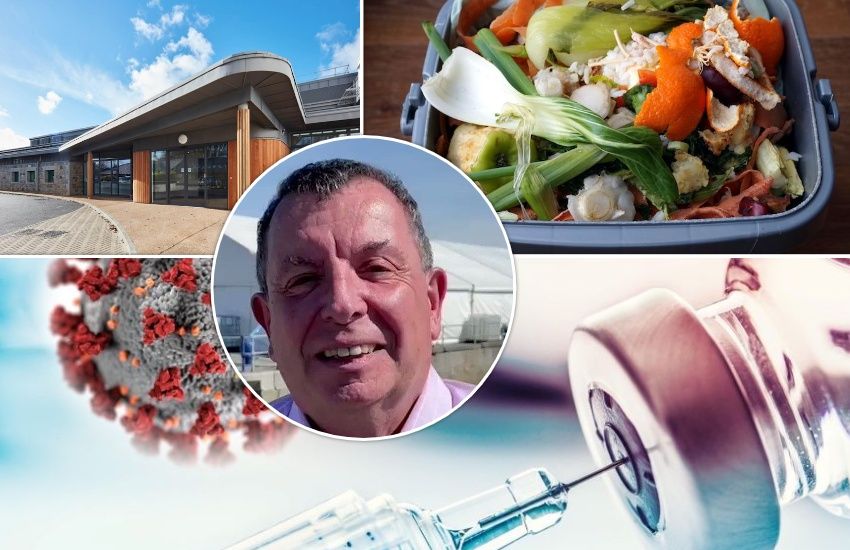

Richard Evans has been close to many of the island’s greatest challenges and most dramatic events of recent years: Fallagate, waste disposal, secondary education, covid.
"I’d do it all again. Yes, it’s a job and a career, but it really is doing something for your island. I loved it," Richard told Express, as his 40-year career as a civil servant – 30 of them in senior roles – came to an end two weeks ago.
"The civil service is much maligned. I’d like to see the perception of the civil service changed. It is a good organisation.
"Look at what the civil service has done during the covid pandemic. We were thrown lots of stuff of which we had no experience. We had no experience of how the public would react. The civil service didn’t panic. It worked out the best way to deal with all the challenges and complexities. Working with politicians and working with businesses and others, it did a pretty good job.
"There seems to be a misconception that the States are overstaffed with people counting beans and pushing pens. I don’t believe that for a moment. What I do believe is that there is room for improvement. Like any organisation, there are things it could do better.
"But I think we should value the civil service [and] I would definitely recommend the civil service as a career."
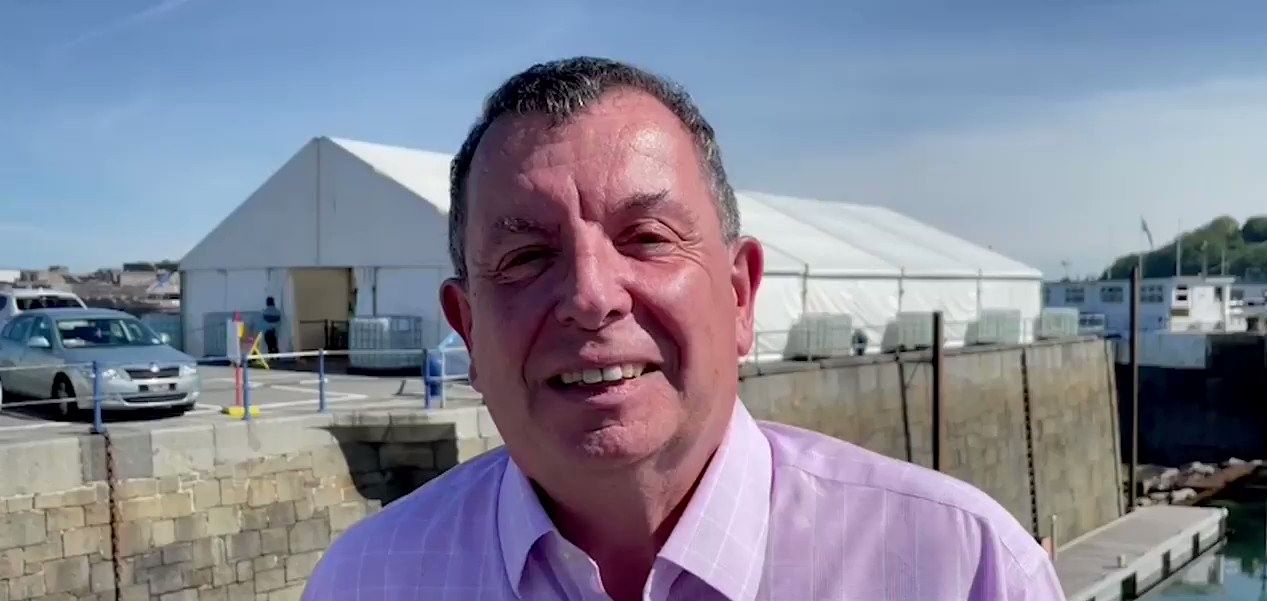
Pictured: Richard Evans has worked across numerous States' committees in a career spanning four decades.
Richard will be 60 later this year. After decades with the Board of Health and its successors, in his 50s he became more of a trouble-shooter – in his own words, "a fixer" – across the civil service. Most notably, he led the waste strategy – the one which finally worked after years of false starts – and the States' operational response to the covid-19 pandemic.
"Just before I left, somebody said to me that I had a reputation for getting difficult things done by bringing people along on the journey with me, and that meant a lot.
"Waste was a big achievement. I can remember sitting in a meeting of the old Public Services Department – it was the committee led by Scott Ogier – and I asked them if they really wanted us to sort out waste and get the strategy in place. I needed their backing. I wanted it in the minutes that they were directing me and backing me to get it done and they did.
"People are always key. You need to get the right people doing what they do well. There were good people on that project. They got the difference between consultation and engagement. We worked really hard to keep stakeholders onboard. We had to compromise. We could have saved quite a bit of money if we had organised collection rounds centrally, but we had to bring the parishes with us.
"In the end, getting it working was about changing behaviours and building projects, and I loved it."

Pictured: The States had spent years trying to resolve the future of waste disposal before formulating a strategy which was finally approved and largely succeeded and which Richard led operationally.
"Covid was like no other experience. Towards the end of 2019, public health [officials] decided they should do an exercise to prepare for a pandemic. That was a very good move because it sharpened people up.
"By February 2020, it was starting to spread across the world, we had established our emergency systems, and the Civil Contingencies Authority had started to meet because they could see what was coming.
"It was daunting. We had plans for an emergency mortuary. The response was organised around cells and there was a mass fatalities cell. Work on things like maintaining critical infrastructure, such as food supplies, really brought home the fragility and seriousness of it all.
"Condor was brilliant. They managed to keep two boats churning through the Channel every day while the whole world was in lockdown. The co-operation between the States and business was unprecedented and impressive.
"My first real experience of automation was with covid. We didn’t have enough people to process all the tests going through the system. So Agilisys [the States’ IT partner] put in three robots – Tom, Dick and Harry. They processed in a minute what it would have taken a human 15 minutes to do and that allowed us to get through the number of tests we needed."

Pictured: Richard's final major role with the States to was to lead their operational response to the largest global pandemic for a hundred years.
As Richard became more senior, he inevitably worked more closely with politicians. They were not an unfamiliar species: his dad, David, was once a much-respected States’ member. "Yes, that probably helped my understanding," said Richard. "He and I talked quite a lot about his experiences in the States as a deputy."
Richard had another experience of supporting a politician – but many years earlier and in a completely different context. He was crewing for Conseiller Peter Dorey, President of the Advisory & Finance Committee, when he was tragically lost at sea.
"I was only 15, nearly 16. It was in the 1979 Fastnet Race.
"I decided that I didn’t like playing football at school and one of the other options was dinghy sailing, which I found that I loved. That’s where my love of boating started. I did a lot of sailing at the Yacht Club and then crewed for various people.
"My family ran the Fleur du Jardin – that’s where I grew up. A chap lived opposite who had a 38ft yacht and he was in the hotel having dinner one night, said there was a yacht race tomorrow and asked me if I wanted to come. That’s how I got into it.
"We had done Cowes Week the week before. The intention was to do the Fastnet Race. We got halfway across the Irish Sea going towards the Fastnet Rock and the weather went bad. We turned around, the boat got capsized, and Peter sadly got washed out the back. There were two people out the back and the rest of us were down below. It was like being in a washing machine when the boat capsized. That was an experience – character building, as they say.
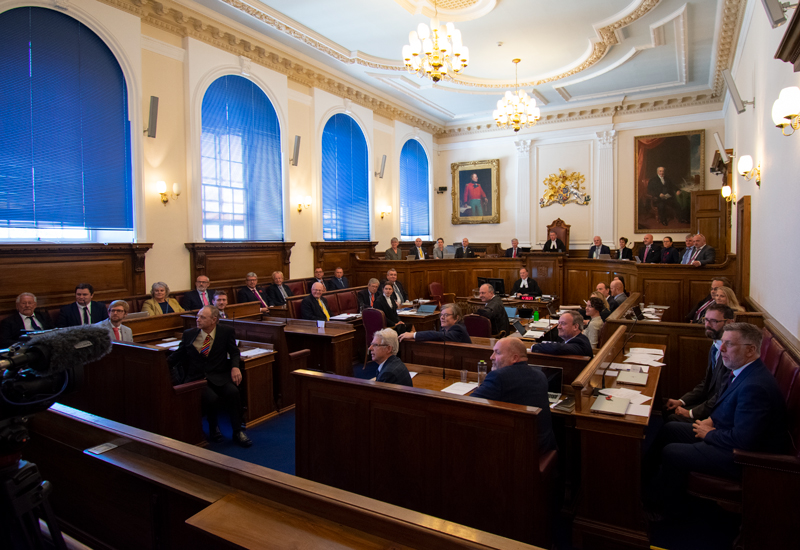
Pictured: Richard has watched dozens of politicians come and go in his 40-year career in the public sector but feels "Guernsey is struggling a bit politically" at the present time.
"I do think politics and politicians have changed," said Richard. He thinks "Guernsey is struggling a bit politically" at the moment – and, therefore, "the civil service is struggling a bit".
"The States we’ve got at the moment, in my view, is quite naïve. A lot of well-meaning, dedicated, good people, but sometimes I wonder whether they have a grip on reality. I’m not sure all of them fully understand what being a politician is. We need a body that is going to make difficult decisions.
"Generally, civil servants don’t make that many major decisions. I always got quite annoyed by comments about civil servants running the island. That has never, ever been my experience."
I asked him whether he had worked with politicians he disliked. “Oh yeah,” he said, without hesitation.
"That is the question about what makes a good civil servant. I firmly believe that the civil service is there to support the elected politicians – the elected government. Civil servants might not agree with politicians or policies. They might not like the way something is being discussed or developed, but it’s the job of the civil servant to provide honest, open, professional, clear advice and then get on and deliver what the elected politicians decide to do."
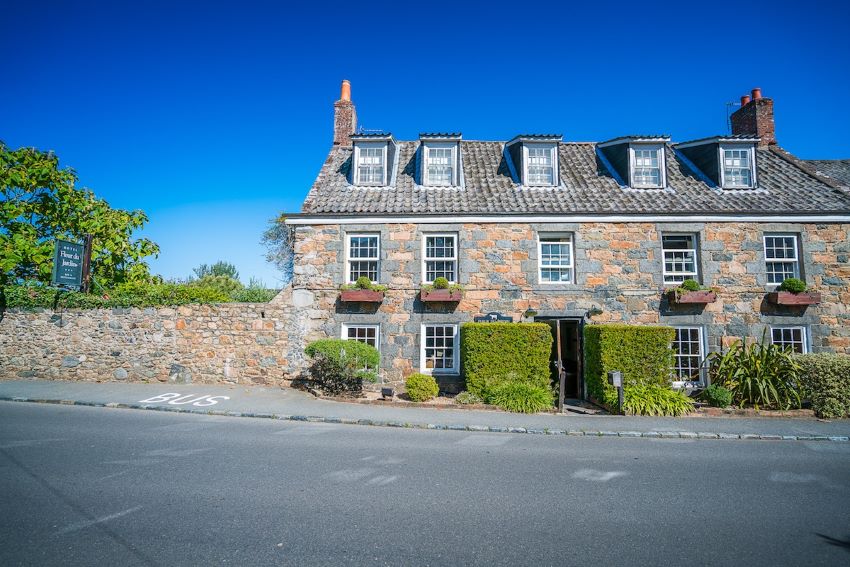
Pictured: Richard grew up at the Fleur du Jardin when it was owned by his family. Credit: Fleur du Jardin.
Richard started his career in catering. After leaving school, his intention was to learn his craft, then travel, and then return and take over the family’s hotel business.
"I left Elizabeth College after O Levels and went to the College of Further Education to do a two-year catering course, learning about food and wine and cookery and the basics of hotel management.
"This is about 1980/81. I thought I’d work for my dad for a few months, but then something came up with the States. It paid well with decent holidays, so I thought I’d go and do that for a bit. I went into the catering department for the Board of Health. I thought I would work for the States for about six months, get a bit of money and then take off.
"One day, dad comes home and says they’ve had an offer for the Fleur. The tourist industry was in decline. The likes of Freddie Laker had started offering cheaper deals to go to places like Spain, and Guernsey and Jersey became less attractive. We’d noticed there were fewer bookings in the hotel. I don’t know if the hotel was actually on the market for sale, but dad came along and said this was a good offer and they were going to take it. That meant I didn’t resign from the States – I stayed and never left."
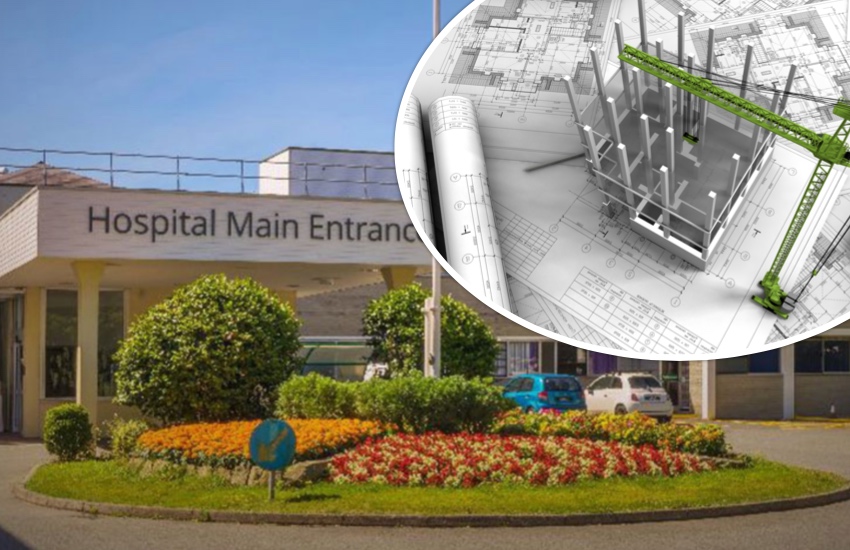
Pictured: Richard spent the first 30 years of his career with the Board of Health and its successors, initially in catering and then in senior roles, which included overseeing large construction projects.
After catering in most of the island’s hospitals for a decade, Richard became the Board of Health’s catering manager.
"Once I got into management, I saw the opportunities to develop a lot of transferable skills. I could see a future – take the training and get myself into a position of some seniority. I really liked the health services because of the people you come into contact with – members of staff and the public – it’s always about the people. I’ve always liked working with lots of different people."
A period effectively as site manager at the Castel Hospital led to a management position at the Princess Elizabeth Hospital. "This is when I met my wife. She was a radiographer at the Hospital, although we met sailing. A friend of ours was doing a race down to France. I’d been crewing for him for years. He said we were a bit short of crew and he asked Gill to come along." Gill and Richard have one child, a daughter.
Pictured: Gill, who is married to Richard, is the States' Disability Officer.
Richard eventually became the second most senior official at the Board of Health. "I worked under David Hughes. He was a great teacher – to be guided and mentored by David was brilliant.
"I cut my teeth on really big projects around Fallagate. I can remember one particularly exciting meeting when Deputy Peter Roffey was President. It all happened at rather short notice and we couldn’t find anyone to take the minutes, so I had to take the minutes. I’m scribbling away furiously as Peter is getting more excited. It was the time I saw Peter at his most animated. Then all the resignations happened pretty much immediately. He resigned and the rest of the Policy Council fell.
"At the same time, we still needed to build a £39m extension to the Hospital. The contractors were mobilising on site. I knew a chap who had worked on the project to build a new court building and I encouraged him to come into our project and we built the ‘new’ clinical block. We were slightly late because we discovered rock in places where we didn’t know there was rock, but we came in under budget. It was a big, complex development.
"Then I went straight into working on the mental health buildings at the back of the Hospital site – another big project. It’s very satisfying to work on projects like that – building a team, bringing people with you, resolving problems which inevitably arise – I enjoyed all of that."
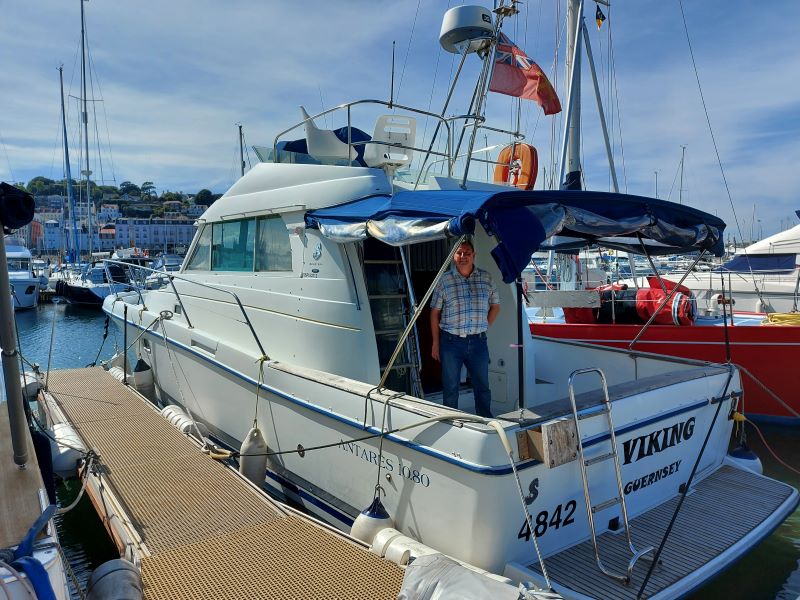
Pictured: Away from work, Richard's main interest is boating. He intends to spend a lot of time on his boat, Viking, this summer.
When asked about colleagues who most influenced him, Richard does not pause for long before identifying one above all others: Nigel Lewis. “I didn’t work with him directly for very long, but what a calming influence Nigel was. He was the ultimate, consummate civil servant. He stands out in my mind.” Richard was also a key lieutenant to Paul Whitfield when the latter was States’ Chief Executive until last year.
There were more difficult times, of course, not least when working with senior colleagues who had difficulty adjusting to Guernsey.
"I would spend a considerable amount of time advising how Guernsey works. The politics; the system; consensus government.
"For a period, I found myself holding the fort until a decision was made to parachute in a director – a turnaround director – from a big NHS Trust. I can remember taking him to one side and going through my routine of explaining how different things were in Guernsey. He was quite dismissive of all that and soon went around creating chaos and carnage. He came back to me about six months later and said I owe you an apology because you were right. In the six months, he had seen and felt the differences for himself.
"I think bringing someone in from outside can be a good thing. It can offer fresh thinking. But I do firmly believe that the States can grow their own to fill senior roles which are difficult and challenging. Guernsey people who have made this place their home probably have a slightly different outlook on life in the island."
Richard is optimistic about the future of the civil service. "We’ve got some very bright and competent young civil servants. The future is bright. We’ve got some excellent, committed staff with the best interests of the Bailiwick at heart."
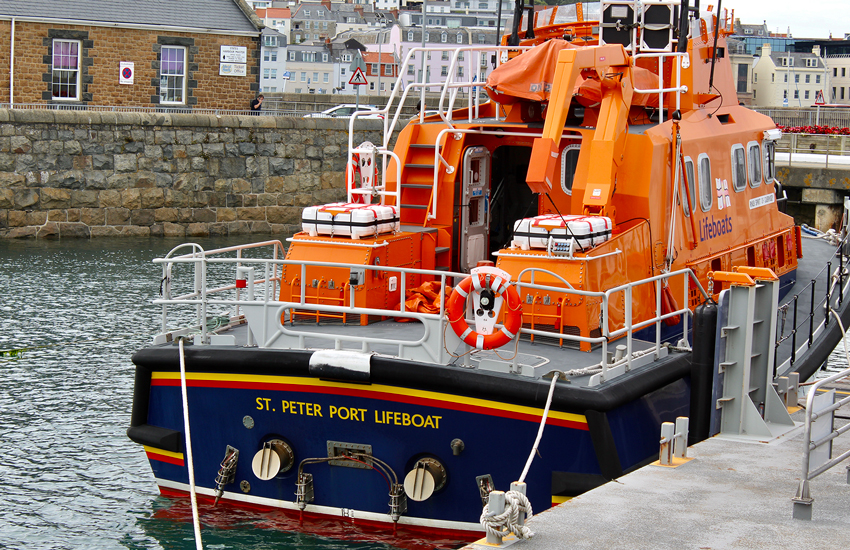
Pictured: Richard's interest in boating led to involvement with the St. Peter Port Lifeboat. Credit: Dylan Ray.
Richard is not ruling out "doing a few bits and pieces for the States occasionally". And he has charitable commitments which may well be expanded.
"I’ve been Treasurer of the St. Peter Port Lifeboat for about six years. That’s a fabulous charity to be involved with. Those guys do some great work and I enjoy working with them. The Guernsey Disability Alliance is trying to get me involved again."
For now, Richard is looking forward to a thoroughly deserved period relaxing where he loves it best – on the water.
"I’m going to be doing a lot more boating. I’m going to take the summer off and ease the last 40 years out of the system and see what happens."
As we end our interview, Richard says "there is one more thing: it’s not a gold-plated pension by the way".
"It’s a deferred salary scheme. One of the benefits of public sector employment is the pension scheme. When you’re 19, the last thing you’re thinking about is financial provision for when you’re 60 or 70. But the States, as an employer, forces you into thinking about that and takes away some of your salary for that purpose, and I think that’s a good thing and a responsible thing and should be perceived as such."
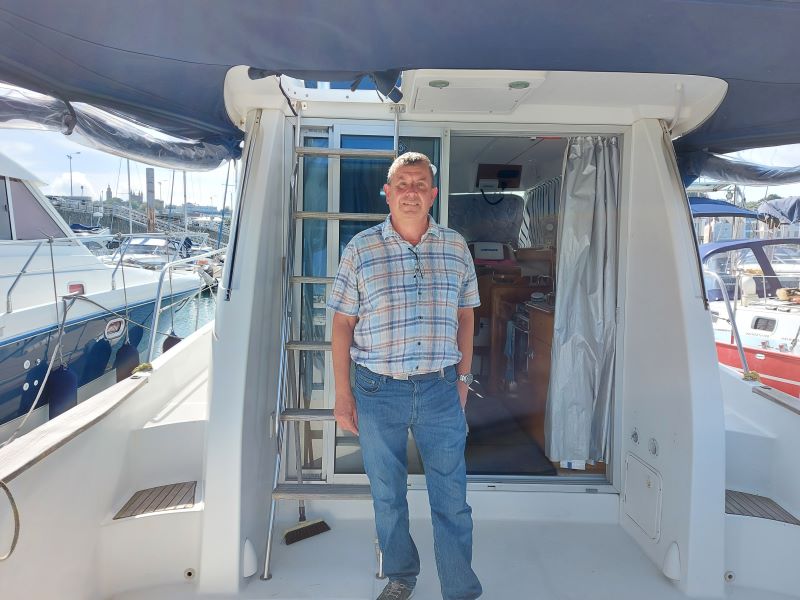
Pictured: Richard on his boat, Viking, a passion he will now have more time to indulge after 40 years' committed service to the island as a public servant.
Comments
Comments on this story express the views of the commentator only, not Bailiwick Publishing. We are unable to guarantee the accuracy of any of those comments.